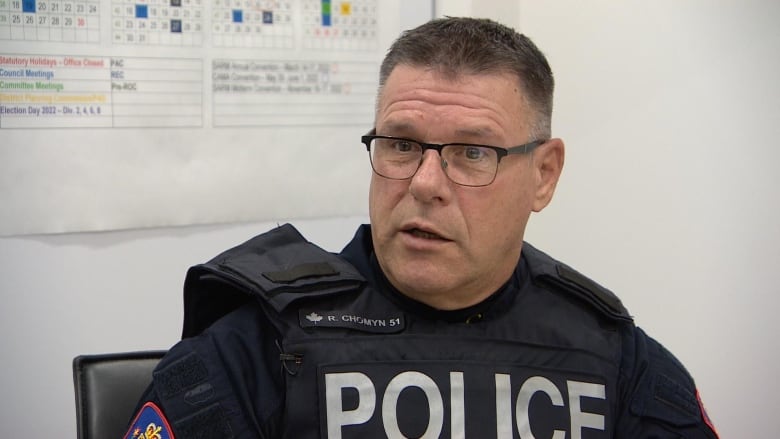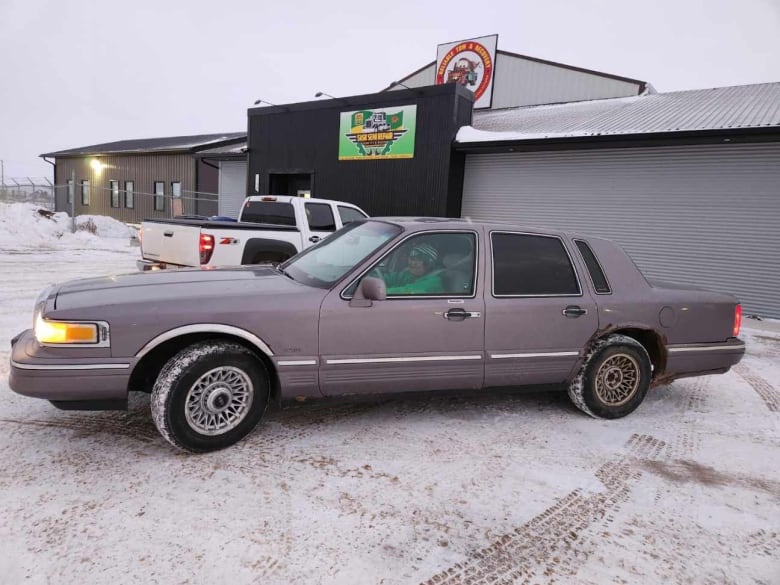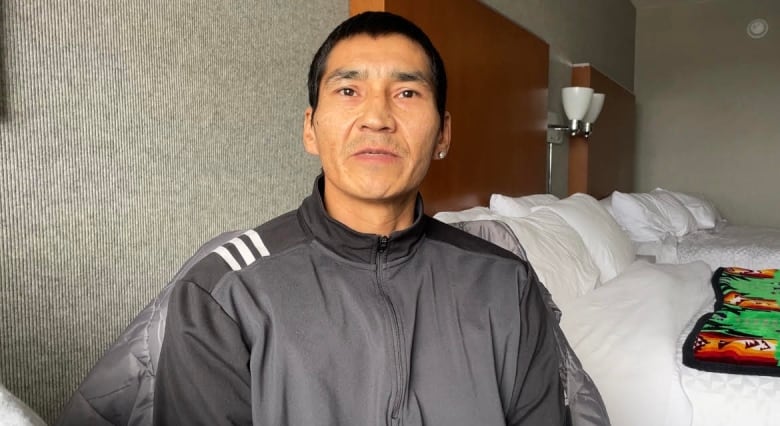
A Big River, Sask., woman and her adult son ended up hiking alongside Highway 12 in the dark with a walker and suitcases for close to an hour on the night of Nov. 15 after a Corman Park Police Service constable impounded their car.
On this much Sylvia Joseph, her son Roddy Joseph and Corman Park Police Service Chief Ronald Chomyn agree.
They disagree, however, on how the 54-year-old and her 38-year-old son came to be pushing her belongings on the shoulder of the busy highway on that winter night.
Sylvia says the Corman park officer left them no choice after impounding the car. The car was seized because Roddy, who was driving, had tested positive for cannabis when given an oral swab by the officer.
“So he says, ‘You’re gonna have to pack up all your stuff and find a ride or start walking,’ ” Sylvia said.
The officer did not offer the option of switching drivers so that they could continue on their way.
Chief Chomyn said audio and video of the interactions were captured on a body camera. Chomyn said he has reviewed the footage, but is unable to share it with CBC.
Chomyn said that at no point did the officer suggest walking to the city as an option.
“Our officer talked to the driver, her son, and expressed that ‘I don’t think it’s safe, it’s dangerous, you guys need to arrange for a ride or let me call you a cab,’ ” he said.
“She chose not to. And you know, legally we can’t stop someone from walking on the highway.”

Erratic driving
Corman Park is a rural municipality that surrounds Saskatoon.
Police say the interaction began when the Corman Park constable began following a grey Lincoln Town Car that was travelling south on Highway 12 around 8 p.m. CST on Nov. 15. It was dark, windy and about –5 C.
The car caught the officer’s attention because it was not staying in its lane, Chomyn said.
Sylvia is a member of the Big River First Nation, about 220 kilometres north of Saskatoon. Once a week, she travels from her home at Debden, near the First Nation, to Saskatoon for dialysis at St. Paul’s Hospital.
She said that, on Nov. 15, she had started off behind the wheel, with her 38-year-old son Roddy in the passenger seat, but they switched off at Blaine Lake when Sylvia got tired. She and Roddy both confirmed that he had smoked cannabis earlier in the day.
Roddy said he struggled keeping the mid-90s Lincoln straight in its lane because it had problems with the steering and low pressure in a front tire.
Roddy said he woke his Mom when they were pulled over. It happened just south of Martensville, where Highway 12 intersects with Township Road 382. The officer checked Roddy’s licence, then took Roddy to his cruiser to do an oral swab for cannabis.
The swab tested positive which, by law, meant that the Joseph’s car would be automatically impounded for three days. This ticket was actually for 30 days because, although Sylvia had a valid license, Roddy was not authorized to drive, police say.
Roadside suspension
Sylvia said the constable told them they could either call a taxi, get someone to pick them up — or walk. She said she had no money for a taxi.
“We don’t have money. When I come over here, the band only gives me enough money for gas. I buy something to drink and something to snack on the way cause it’s a two-and-a-half hour drive,” she said.
She said she asked whether the officer would pay for the taxi and he said no.
Roddy then began calling Sylvia’s sister in Saskatoon, but she was taking care of another family member and was not picking up.

Evelyn Halkett, Sylvia’s sister, said she finally turned on her phone after 9 p.m. CST, and discovered a series of texts and missed phone messages from her nephew and sister.
Halkett provided copies of the time-stamped messages to CBC.
“Hello my Sissy. I need you to come pick me up. We got my car taken for 30 days,” reads the first message, a text at 8:16 p.m. CST.
Then follows a series of missed calls — at 8:17, 8:19, 8:22, 8:24, 8:28, 8:29 — until Evelyn finally picks up after 9 p.m. CST.
She raced north out of the city to pick up her sister and nephew.
“So I’m coming down Idylwyld [Drive], passing Costco and so I’m looking on my left-hand side thinking, OK, where are they? My heart is hurting because it’s my sister, walking with her walker, her car got taken away,” she said.
“I was almost to the point of speeding because it’s cold out there. And she could barely walk, all her stuff were piled on the walker. So she’s pushing that.”
Sylvia said she’s speaking out now because she doesn’t want anyone else to go through a similar experience.
“I want these cops to take it easy on Natives, all Natives. Treat them fair like everybody else. Don’t treat them rough like what they did to me.”
Chomyn said race had nothing to do with what happened.
“It’s not a race issue. It doesn’t matter. We deal with First Nations people all the time,” he said.
Police perspective
Chomyn said the interaction with the constable, from the initial stop to the demand for an oral swab to the tow truck arriving, lasted about an hour.
He said the body camera footage showed the conversations between Sylvia, Roddy and the officer were civil and non-confrontational. Roddy, for example, did not complain or dispute the positive cannabis reading, Chomyn said.
There are two stages to cannabis testing on the roadside.
The oral swab test that Roddy took doesn’t determine exactly how much THC is in someone’s body, or if someone is actually impaired by the cannabis in their system. It simply gives a pass or fail result if someone has more than 25 nanograms of THC in their system.
Chomyn said that Roddy did not show signs of impairment, so he was not given further testing at a police station.
However, Chomyn said that once the officer determined Roddy had been driving without a valid licence, he had no discretion on whether impound the vehicle.
Chomyn said the officer spoke with Sylvia after the car was impounded.
“He asked her what what the plan was because the vehicle was being seized. He asked if she would like him to call her a cab, and she asked if he would pay for it … and he said no, we don’t pay for cabs,” he said.
“He asked if she was able to get hold of anyone to pick them up and she said no. And he said, ‘So what is your plan?’ And she said, ‘I’ll walk.’ And she turned and walked away and went back to the car and started getting her stuff out.”
Chomyn said the officer, who has a little more than two years experience, could not force them to stay,
“Roddy had been served all his documentation. It wasn’t a criminal arrest, he wasn’t under arrest. They were not being detained after that fact for any reason.”
Chomyn said that, given the amount of luggage involved and that it was two people, the officer did not have space in the cruiser to drive them into the city.
Later, after the tow truck had retrieved the car, the officer drove south check on their progress, Chomyn said.
“He did drive south toward the city looking for them and was unable to to see them, so he assumed that they had safely made it in, that somebody had stopped or they had called the cab,” he said.

Roddy said he’s still shaken by what happened.
“I just felt ugly that I had to walk with my mother. It’s unreal,” he said.
“It’s not supposed to be like that.”
Chomyn declined to speculate whether the officer could — or should — have contacted RCMP to alert them about the pair walking down the highway, or whether the officer would have reacted differently had it been significantly colder that night.
“They were walking from where they were on a minus-five night,” he said.
“The danger was from traffic, or something like. It wasn’t from the elements.”